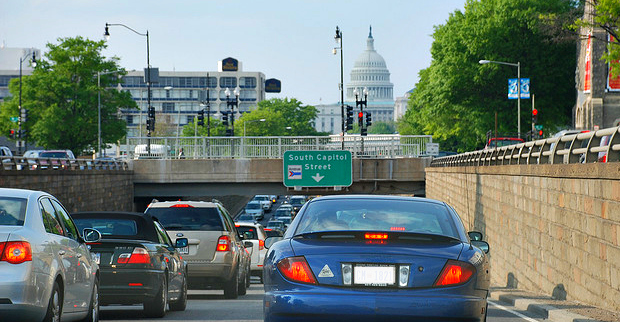The cost of traffic congestion exceeds wasted time
The 2011 Urban Mobility Report, published by the Texas Transportation Institute at Texas A&M University, reveals that traffic congestion levels in the past year now average 34 hours nationally, up 14 hours from 1982. The study shows that the cost of congestion is over $100 billion, roughly $750 per commuter, a problem that is no longer about “rush hour,” as 40 percent of the delays occurred overnight or mid-day, causing issues for businesses that rely on production and delivery.
The report says commuters feel the impact of traffic congestion in the form of wasted time while manufacturers see a loss to their bottom line which the study says could potentially raise prices and weaken employment. Tim Lomax, one of the study’s author said, “Congestion does more than choke our highways, it chokes our economy, making it harder to buy what we need and harder to keep or find a job. That’s a bad thing – especially when our economic recovery is so fragile.”
The study emphasizes that there is no single fix to the overall congestion problem in our nation, rather Lomax notes, “The solution mix may be different for each city, but the one thing they all share in common is urgency. If we want a strong economy, doing nothing is not a productive option.”
Congestion in very large urban areas:
In urban areas with over three million residents, D.C. takes the cake, with commuters are delayed 74 hours per year in traffic, above and beyond the time it would normally take to get from their home to their destination without any traffic.
Number of hours in yearly delays per commuter: Urban area
- 74 hours: Washington DC-VA-MD
- 71 hours: Chicago, IL
- 64 hours: Los Angeles-Long Beach-Santa Ana, CA
- 57 hours: Houston, TX
- 54 hours: New York-Newark NY-NJ-CT
- 50 hours: San Francisco-Oakland, CA
- 47 hours: Boston MA-NH-RI
- 45 hours: Dallas-Fort Worth, TX
- 44 hours: Seattle, WA
- 43 hours: Atlanta, GA
Congestion in large urban areas:
In urban areas with over one million but under three million residents, Baltimore has the most painful commute, wasting 52 hours of residents’ time above and beyond the time it would normally take to get from their home to their destination without any traffic.
Number of hours in yearly delays per commuter: Urban area
- 52 hours: Baltimore, MD
- 49 hours: Denver, CO
- 45 hours: Minneapolis-St. Paul, MN
- 38 hours: Austin, TX
- 38 hours: Orlando, FL
- 37 hours: Portland OR-WA
- 37 hours: San Jose, CA
- 35 hours: Nashville-Davidson, TN
- 35 hours: New Orleans, LA
- 34 hours: Virgnia Beach, VA
Congestion in medium sized urban areas:
In urban areas with populations between 500,000 and one million, Baton Rouge has the worst commute, wasting 36 hours of residents’ time above and beyond the time it would normally take to get from their home to their destination without any traffic.
Number of hours in yearly delays per commuter: Urban area
- 36 hours: Baton Rouge, LA
- 36 hours: Bridgetport-Stamford CT-NY
- 33 hours: Honolulu, HI
- 31 hours: Colorado Springs, CO
- 28 hours: New Haven, CT
- 27 hours: Birmingham, AL
- 26 hours: Hartford, CT
- 25 hours: Albuquerque, NM
- 25 hours: Charleston, SC
- 24 hours: Oklahoma City, OK
Congestion in small urban areas:
In urban areas with under 500,000 residents, Columbia, SC adds 25 hours of residents’ time to their commute, above and beyond the time it would normally take to get from their home to their destination without any traffic.
Number of hours in yearly delays per commuter: Urban area
- 25 hours: Columbia, SC
- 24 hours: Little Rock, AR
- 23 hours: Cape Coral, FL
- 22 hours: Beaumont, TX
- 22 hours: Salem, OR
- 19 hours: Boise, ID
- 19 hours: Jackson, MS
- 18 hours: Pensacola, FL-AL
- 18 hours: Worcester, MA
- 16 hours: Greensboro, NC
Tara Steele is the News Director at The American Genius, covering entrepreneur, real estate, technology news and everything in between. If you'd like to reach Tara with a question, comment, press release or hot news tip, simply click the link below.







































